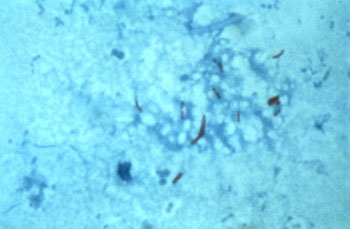|
The Advisory Committee on Immunization
Practices (ACIP). (2007). Recommended Adult Immunization Schedule:
United States, October 2007-September 2008. Annals of Internal
Medicine, 147, 10, 725-729. Retrieved November, 2010 from
http://www.annals.org/cgi/content/full/147/10/725.
Boyce, J.M. & Pittet, D. (2002).
Guideline for hand hygiene in health-care settings: Recommendations
of the Healthcare Infection Control Practices Advisory Committee
and the HICPAC/SHEA/APIC/IDSA Hand Hygiene Task Force. Morbidity
and Mortality Weekly Report, 51, (RR16), 1-44. Retrieved
November, 2010
http://www.cdc.gov/mmwr/preview/mmwrhtml/rr5116a1.htm.
Centers for Disease Control
and Prevention (CDC). (2008). National Healthcare Safety Network
(NHSN). Retrieved November, 2010 from
http://www.cdc.gov/ncidod/dhqp/pdf/Scott_CostPaper.pdf.
Centers for Disease Control
and Prevention (CDC). (2008a). Hand Hygiene Interactive Training
Course. Retrieved November, 2010 from http://www.cdc.gov/handhygiene/index.html.
Centers for Disease Control
and Prevention (CDC). (2008b). Injection Safety Practices.
Retrieved November, 2010 from http://www.cdc.gov/injectionsafety/.
Centers for Disease Control
and Prevention (CDC). (2008c). Injection Safety for Providers.
Retrieved November, 2010 from http://www.cdc.gov/ncidod/dhqp/ps_providerInfo.html.
Centers for Disease Control
and Prevention (CDC). (2007). Estimates of Healthcare Associated
Infections. Retrieved November, 2010 from
http://www.cdc.gov/ncidod/dhqp/hai.html.
Centers for Disease Control
and Prevention (CDC). (2007a). Questions and Answers About
Healthcare Associated Infections. Retrieved November, 2010
from
http://www.cdc.gov/ncidod/dhqp/hai_qa.html.
Centers for Disease Control
and Prevention (CDC). (2002). Guideline for Hand Hygiene in
Health-Care Settings. Morbidity & Mortality Weekly Review,
51, RR16, Retrieved November, 2010 from http://www.cdc.gov/mmwr/PDF/rr/rr5116.pdf.
Centers for Disease Control
and Prevention (CDC). (2007b). Guidelines for Isolation Precautions:
Preventing Transmission of Infectious Agents in Healthcare
Settings. Retrieved November, 2010 from http://www.cdc.gov/ncidod/dhqp/pdf/guidelines/Isolation2007.pdf.
Centers for Disease Control
and Prevention (CDC). (2006). Infectious Diseases in Healthcare
Settings. Retrieved November, 2010 from http://www.cdc.gov/ncidod/dhqp/id.html.
Centers for Disease Control
and Prevention (CDC). (2005). Updated US Public Health Guidelines
for the management of occupational exposure to HIVand recommendations
for postexposure prophylaxis. Morbidity & Mortality Weekly
Review, 54, RR(09), 1-17. Retrieved November, 2010 from
http://www.cdc.gov/mmwr/preview/mmwrhtml/rr5409a1.htm.
Centers for Disease Control
and Prevention (CDC), National Center for Infectious Diseases,
Division of Healthcare Quality Promotion. (2004). 12 Steps
to Prevent Antimicrobial Resistance: Hospitalized Adults.
Retrieved November 2010 from
http://www.cdc.gov/drugresistance/healthcare/ha/HASlideSet.pdf.
Centers for Disease Control
and Prevention (CDC), Division of Healthcare Quality Promotion.
(2004a). Personal Protective Equipment (PPE) in Healthcare
Settings. Retrieved November, 2010 from www.cdc.gov/ncidod/dhqp/ppe.html.
Centers for Disease Control
and Prevention (CDC). (2003a). Guidelines for environmental
infection control in health care facilities: recommendations
of CDC and the Healthcare Infection Control Practices Advisory
committee (HICPAC). Morbidity and Mortality Weekly Review,
52, RR10, 1-42.
Centers for Disease Control
and Prevention (CDC). (2003). Guidelines for Infection Control
in Dental Health-Care Settings - 2003. Retrieved November,
2010 from
http://www.cdc.gov/OralHealth/infectioncontrol/guidelines/slides/001.htm.
Centers for Disease Control
and Prevention (CDC). (1997). Immunization of healthcare workers:
Recommendations of the Advisory Committee on Immunization
Practices (ACIP) and the Hospital Infection Control Practices
Advisory Committee (HICPAC). Morbidity and Mortality Weekly
Review, 46, (RR18), 1-42.
Edwards, J.R., Peterson, K.D.,
Andrus, M.L., Dudeck, M.A., Pollock, D.A., Horan, T.C., and
the National Healthcare Safety Network Facilities. (2008).
National Healthcare Safety Network (NHSN) Report, data summary
for 2006 through 2007, issued November, 2008. Retrieved November,
2010 from http://cdc.gov/ncidod/dhqp/pdf/nhsn/2008NHSNReport.pdf.
Jarvis, W.R. (2001). Infection
control and changing health-care delivery systems. Journal
of Emerging Infectious Diseases, 7, 2. Retrieved November,
2010 from
www.cdc.gov/ncidod/eid/vol7no2/jarvis.htm.
Joint Commission on Accreditation
of Healthcare Organizations (JCAHO). (2003). Infection control
related sentinel events. Sentinel Event ALERT, 28,
January 22, 2003.
Kramer, A., Schwebke, I., Kampf,
G. (2006). How long do nosocomial pathogens persist on inanimate
surgaces? A systematic review. BMC Infectious Disceases,
6 (130).
Leigh, J.P., Wiatrowski, W.J.,
Gillen, M., & Steenland, N.K. (2008). Characteristics of persons
and jobs with needlestick injuries in a national data set.
American Journal of Infection Control, 36(6), 414-420.
National Institute for Occupational
Safety and Health (NIOSH). (2008). Preventing Needlesticks
in Surgical Personnel. Retrieved November, 2010 from
http://www.cdc.gov/niosh/blog/nsb031708_needlesticks.html.
National Institute for Occupational
Safety and Health (NIOSH). (2002). State by State Provisions
of State Needle Safety Legislation. Retrieved November, 2010
from
http://www.cdc.gov/niosh/topics/bbp/ndl-law-1.html#ny.
New York State. (August 7, 2008).
Governor Patterson signs bill to expand disability benefit
eligibility to additional participants in World Trade Center
rescue and recovery; Signs Additional Law to Improve Patient
Safety by Giving Consumers More Information, Strengthening
Oversight of Physicians and Enhancing Infection Control Measures.
New York State Press Release. Retrieved November, 2010
http://www.ny.gov/governor/press/press_0807082.html.
New York State Department of
Health (NYSDOH). (2007). How to Safely Dispose of Household
Sharps. Pamphlet. Retrieved November, 2010 from
http://www.health.state.ny.us/publications/0909.pdf.
Occupational Safety and Health
Administration. US Department of Labor. (2003). Most Frequently
Asked Questions Concerning the Bloodborne Pathogens Standard.
Retrieved Nobember, 2010 from http://www.osha.gov/SLTC/bloodbornepathogens/index.html.
Rutala, W.A., Weber, D.J.,
and the Healthcare Infection Control Practices Advisory Committee
(HICPAC) for the Centers for Disease Control and Prevention
(CDC). (2008). Guidelines for Disinfection and Sterilization
of Healthcare Facilities, 2008. Retrieved November, 2010 from
http://www.cdc.gov/ncidod/dhqp/pdf/guidelines/Disinfection_Nov_2008.pdf.
Sehulster, L. & Chinn, R.Y.W.
(2003). Guidelines for environmental infection control in
health-care facilities: recommendations of CDC and the Healthcare
Infection Control Practices Advisory Committee (HICPAC). Morbidity
and Mortality Weekly Report, 52, (RR10), 1-42. Retrieved
November, 2010 from http://www.cdc.gov/mmwr/preview/mmwrhtml/rr5210a1.htm.
Siegel, J.D., Rhinehart, E.,
Jackson, M., Chiarello, L. & the Healthcare Infection Control
Practices Advisory Committee for the Centers for Disease Control
and Prevention. (2007). Guidelines for Isolation Precautions:
Preventing Transmission of Infectious Agents in Healthcare
Settings-2007. Retrieved November, 2010 from
http://www.cdc.gov/ncidod/dhqp/pdf/guidelines/Isolation2007.pdf.
USA Today. (March 26, 2008).
Patient turns harsh light on clinics reusing syringes, by
Janet Kornblum.

Mycobacterium tuberculosis
Continue on to
|